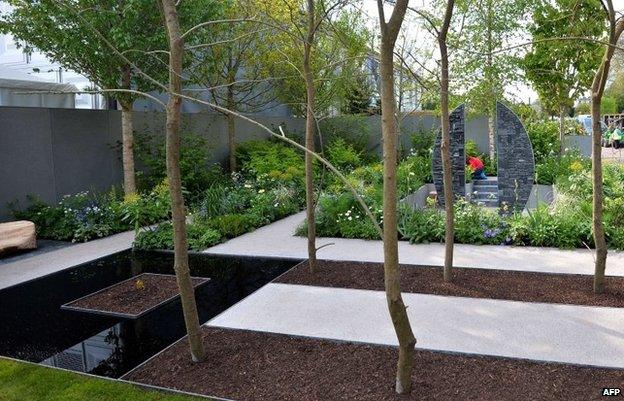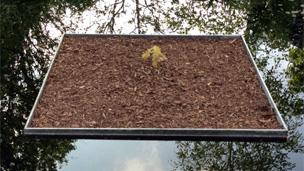Chelsea Flower Show and our island mentality
- Published

The tiny seedling on an island in the Stop the Spread garden
Among the exuberant and heady nostalgia of the 100th anniversary Chelsea Flower Show is an exhibit which touches a visceral British anxiety.
You could walk past it without noticing.
But if you do, it delivers a poignant message - particularly in a week overshadowed by grim events on the other side of the capital.
A little oak tree struggles to fulfil its destiny on a small island. Here, in horticultural form, is the tension of our nation. Are we independent and proud or isolated and vulnerable?
The wider message of the garden that includes the oak seedling (these days gardens at Chelsea are almost expected to have a message) is "Stop the Spread". Our countryside is under threat from invasive non-native species, says the leaflet.
"On the island in the middle of the pool a single seedling grows," the garden's designer Jo Thompson explains in the bumf.
"While at first it may seem vulnerable, it promises new shoots of hope that reflect our aim of working together to help stop the spread."
Concern about the loss of indigenous wildlife to foreign invaders was also a theme of Wednesday's State of Nature report, external. Turtle doves and red squirrels, water voles and ladybirds - familiar and much-loved British species are declining, often because of external threats.
But does that fragile oak sapling also exemplify a force in our social and political sphere?

Green shoots
For some, the horrifying event in Woolwich this week is another reason to question the diversity of culture and ideas in our little island nation.
The challenge of globalisation and the worldwide web of communications that shrink our planet shapes the national conversation at the moment.
The sense of national essence diluted or contaminated by multinational forces, is a large part of what drives support for the UK Independence Party. The blazered white British gent with his pint of foaming bitter is portrayed as an endangered species.
The frustration of some grassroot Conservatives is that the Tory prime minister does not appear to share their determination to hold out against the forces of change - whether that be the idea of gay marriage or the prospect of Romanian and Bulgarian migrants arriving courtesy of EU membership.
These concerns are not exclusive to the political right. In deprived Labour heartlands up and down Britain, I have heard the same fears:
jobs lost to the other side of the planet
foreigners squeezing local people out of housing, schools and public services
traditional habitat and customs being abandoned in a multicultural fog.
There is another anxiety reflected in that little oak tree, though. It is of an island people cut off from the wider world - isolated and exposed.
The British have a strong sense of their own decline.
Our national story is often framed in terms of a once-great global power on the wane.
You will regularly hear people talk blithely about this island country going to the dogs or to hell in a handcart.
The news may often read like a litany of ghastly events, but look beyond the headlines and it is clear that we are not.
I was talking to BBC journalists on Tuesday about the positive numbers that belie the struggles of austerity and global change.
In many ways, our neighbourhoods appear to be getting stronger:
big falls in crime and signs that concerns over anti-social behaviour are declining
a confidence in family life despite structural change
community cohesion generally improving in the last 10 years.
The response to the Woolwich killing will test the strength of these improvements. The first signs are encouraging.
Challenges remain - plenty of them. But it is probably fair to say that our island nation is somehow coping in difficult times. Keep calm and carry on.
Perhaps the message of the little oak tree is that, if we take the time to look, there are shoots of hope.